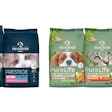
While scientists still have much to learn about what causes dilated cardiomyopathy (DCM) in dogs, pet food companies do have tools to deal with DCM while researchers look for answers. Genetic screening may allow pet owners to identify aspects of their pet’s DNA that may put the dog at higher risk for DCM. However, the exact genetic markers for DCM risk remain poorly understood. For those dogs that are susceptible to the heart disease, or to avoid the potential, dog food formulators may supplement recipes with certain chemical compounds, taurine and L-carnitine, one veterinary nutrition researcher and consultant told Petfood Industry. However, like DCM itself, these supplements need more research to help scientists understand why dogs with similar diets develop DCM or not. Similarly, scientists need more investigations to examine the influence of other ingredients on taurine and L-carnitine in a dog’s body to understand, for example, if legumes in kibble somehow influence DCM risks.
“DNA screening can be helpful in identifying some genes that have been linked to DCM,” Dr. Renee Streeter, DVM, principal clinical nutritionist with BSM Partners, a pet industry consulting agency, said. “However, we must keep in mind that the causative gene in many cases of DCM remains unknown. Therefore, while DNA testing may not identify an actual genetic cause, it can help to identify mixed breed dogs that have an ancestral link to DCM. For example, the black and tan mixed breed dog could actually be 50% Doberman, putting it at risk for developing DCM.”
Streeter and her team reviewed more than 150 published studies looking for connections among cases of canine dilated cardiomyopathy (DCM) and grain-free dog food. They published their review of existing scientific research on dog nutrition and its relationship to DCM in the Journal of Animal Science.
Research on DCM and dogs’ genomes
Other scientists have examined DCM in dogs, looking for unknown DNA connections to the heart disease. In 2016, a University of Missouri – Columbia researcher analyzed the whole genomes of various dog breeds with inherited genetic disorders, reported nutrition consultant Dr. George Collings, PhD, for Petfood Industry. The researcher identified genetic components of DCM in Standard Schnauzers. The dogs inherited the disease in a pattern suggesting a recessive gene on a dog’s autosomal chromosome, meaning one not related to sex. Many of these dogs carried an allele, or version, of the gene RBM20 with a deleted portion, similar to an allele found in human DCM cases. Another scientist identified several potential genetic associations with DCM, but he found that genes related to human DCM didn’t appear in Doberman Pinschers with DCM. A mitochondrial gene associated with glucose metabolism was found, though, although it hadn’t been in human cases. Other scientists have observed that taurine depletion in the body can be related cardiomyopathy. A 1986 study demonstrated that taurine depletion changes heart muscles metabolism of carbohydrates.
Taurine supplementation may reduce the risk of dogs developing DCM. A similar strategy keeps DCM at bay in cats. Cats can’t synthesize their own taurine, so cat food has to provide it, just as prey used to for the felines. Scientists thought dogs were capable of synthesizing taurine, but there may be difference among breeds and individuals.
“It is pretty well accepted that taurine and L-carnitine supplementation can improve cardiac health especially in dogs with an issue,” Streeter said. “It is likely that if these ingredients were to be supplemented in the diet, they would also help prevent some issues. Since recent research has begun to examine this, it is possible these may become new dietary requirements for dogs in order to help prevent cardiac disease. More controlled studies are also needed, and are underway, which may help us to determine if when certain ingredients, such as legumes or novel protein sources, are used in formulations, the likelihood of altering amino acid status or cardiac parameters increases. If this is found to be the case, the next question we will need to answer is, can supplementation with taurine or L-carnitine be used to prevent cardiac issues from arising, even if these ingredients are used. While use of these ingredients is not crucial for many dogs, it is important for some (and for many owners) and therefore it is important for us to have a good understanding of the issue. In addition, it is important to be sure that if there is an issue identified, that ingredients not yet implicated could none-the-less be playing a role. We need to be sure we are taking all of this into account when formulating.”
FDA investigation into DCM and grain-free dog food
In July 2018, the U.S. Food and Drug Administration’s (FDA) publicly announced the agency’s investigation into correlations among certain dog foods and DCM. Federal authorities examined reports of DCM in dogs eating certain diets labeled as grain-free, particularly those containing peas, lentils, other legume seeds, or potatoes as main ingredients, which were more common in diets labeled as grain-free. A year later, the agency released data from their investigation that stated 93% of the 524 reported cases of DCM, involved dog foods made with peas and/or lentils, while 90% of the afflicted dogs had eaten diets labeled as grain-free. The FDA named 16 brands most frequently eaten by dogs involved in official reports of DCM. Sales of grain-free dog food in general, and those named brands especially, fell following FDA’s announcements, while more new products began to include taurine. Pet food companies adapted their marketing, while developing new dog foods, treats and toppers specifically meant to ease pet owners fears of DCM. Instead of claiming that all grain in pet foods were negative, brands became “grain friendly” as they began to include ancient grains or other “healthy grains, while continuing to malign conventional grains like wheat and corn.
Although the FDA investigation caused upheaval in the pet food industry, scientists and other involved with the pet food industry have pointed out the lack of direct evidence connecting those grain-free dog foods to DCM, since the first FDA announcement. Likewise, some have criticized the FDA for going public with the investigation before solid evidence existed, especially considering the negative economic consequences for dog food brands.
Canine dilated cardiomyopathy heart disease
DCM affects dogs’ heart muscles. The disease results in an enlarged heart. As the heart and its chambers become dilated, pumping becomes more difficult and heart valves may leak, leading to a buildup of fluids in the chest and abdomen. DCM often results in congestive heart failure. Heart function may improve in cases that are not linked to genetics with appropriate veterinary treatment and dietary modification, if caught early. Breeds that are typically more frequently affected by DCM include large and giant breed dogs, such as Great Danes, Boxers, Newfoundlands, Irish Wolfhounds, Saint Bernards and Doberman Pinschers. It is less common in small and medium breed dogs, except American and English Cocker Spaniels. Cases reported to the FDA included Golden and Labrador Retrievers, Whippets, a Shih Tzu, a Bulldog and Miniature Schnauzers, as well as mixed breeds.


















